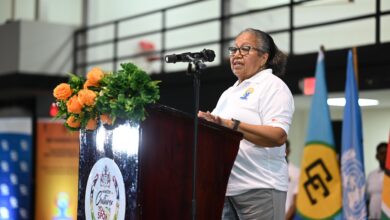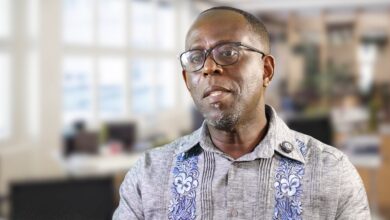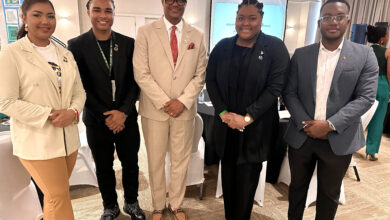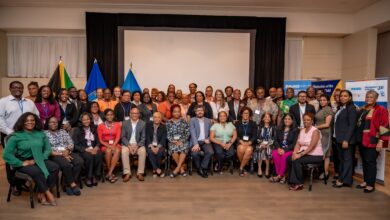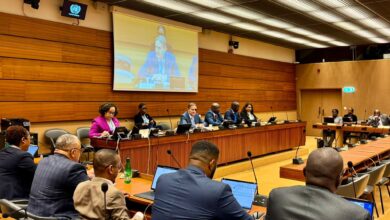“The collaboration between PAHO and CARICOM represents a union of expertise, resources, and shared commitment. PAHO, with its extensive technical knowledge, global health connections, and experience in regional health initiatives, supports CARICOM’s vision of a healthy and resilient Caribbean.”
Hon. Dr Frank Anthony, Minister of Health, Guyana
Georgetown, Guyana, 15 November 2024: The Pan American Health Organization (PAHO) has been challenged by its stakeholders and Caribbean member states representatives to ensure that its new Caribbean Subregional Cooperation Strategy (SCS) 2025-2029, is responsive and practical and when implemented, impactful.
During the opening of a multisectoral stakeholder consultation hosted at the CARICOM Secretariat, in Georgetown, Guyana, Minister of Health, the Honourable Frank Anthony, stressed the need for partnership to tackle priority areas including noncommunicable diseases and mental health, pandemic preparedness and health security, human resources for health, health equity and accessibility and environmental health.
“The collaboration between PAHO and CARICOM represents a union of expertise, resources, and shared commitment. PAHO, with its extensive technical knowledge, global health connections, and experience in regional health initiatives, supports CARICOM’s vision of a healthy and resilient Caribbean. In working together, PAHO and CARICOM can design health strategies deeply rooted in the Caribbean context – strategies that consider our unique cultural, socioeconomic, and environmental realities,” Minster Anthony noted. He suggested that the pathways to sustainable partnership were data-driven decision-making, capacity building and workforce development, community engagement and public awareness and innovation and technology integration.
Critical soundbites from the Minister’s speech are below:
PAHO was praised by Assistant Secretary General, Directorate of Human and Social Development, Elizabeth Solomon, for its role as a development partner across Member States and its alignment with CARICOM’s Caribbean Cooperation in Health (CCH) Framework, the regional architecture for improving health outcomes and strengthening health systems across CARICOM Member States. “In this context, CARICOM anticipates the value that this new iteration of the PAHO Subregional Cooperation Strategy will add to pertinent and impactful public health initiatives to advance the well-being of the Region,” ASG Solomon underlined,” ASG Solomon stated.
Listen to key takeaways from the ASG’s remarks below:
Acting Director of the Caribbean Subregional Program Coordination office, Dr Juan Manuel Sotelo pointed out that once this medium-term planning tool is completed and approved, it will guide PAHO activities, outputs, budget and efforts. This was echoed by Head of Country and Subregional Coordination, Piedad Huerta, PAHO/WHO who outlined that the SCS will allow for the assessment of internal technical, managerial and administrative capabilities to ensure that the organisation delivers impactful health initiatives across the Caribbean.
The previous SCS expired in 2019. Considering the evolving health landscape and emerging challenges, the PAHO Director, has requested the development of a new SCS to guide PAHO’s technical cooperation in the Caribbean.
About CARICOM: The Caribbean Community (CARICOM) was established on 4 July 1973 with the signing of the Treaty of Chaguaramas, which was revised in 2001 to allow for the establishment of a single market and economy. The Community comprises fifteen Member States and six Associate Members. It is home to approximately sixteen million citizens, 60% of whom are under 30 years old. CARICOM rests on four main pillars: economic integration; foreign policy coordination; human and social development; and security cooperation. Through the combined efforts to build a “Community for All”, it remains one of the best examples of integration in the developing world and is the oldest surviving integration movement. The CARICOM Secretariat, the principal administrative organ of the Community, is headquartered in Georgetown, Guyana.
About the Pan American Health Organisation: The Pan American Health Organization (PAHO) works with the countries of the Americas to improve the health and quality of life of its population. Founded in 1902, it is the world’s oldest international public health agency. It serves as the Regional Office of WHO for the Americas and is the specialized health agency of the Inter-American system.
The PAHO Subregional Program is responsible for providing subregional technical cooperation and to strengthen PAHO’s engagement with the Caribbean Subregional integration mechanisms, the Caribbean Community (CARICOM) and its various bodies and organs; and to build synergistic partnerships with the West Indies (UWI), among others. PAHO’s subregional technical cooperation specifically focuses on public health issues which would benefit from economies of scale and for which agreement on proposed collective responses and actions would produce a far greater impact rather than individual country responses. The Subregional Program also plays a role in coordinating among the different PAHO country offices.


